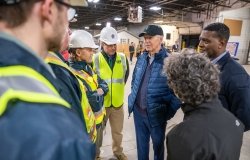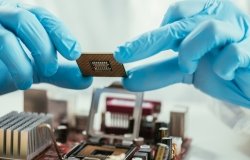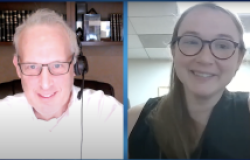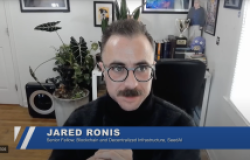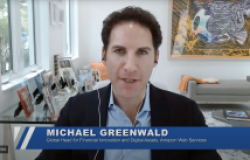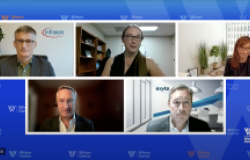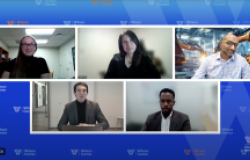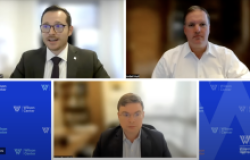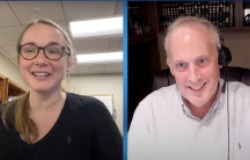Leading Scientists Discuss Converging Technologies
Scientists talk about the convergence of nanotechnology, biotechnology, information technology and cognitive science in this collection of exclusive interviews produced by the Science & Technology Innovation Program in conjunction with the National Science Foundation.
The Science & Technology Innovation Program at the Wilson Center is working with the National Science Foundation (NSF) to interview scientists working at the convergence of nanotechnology, biotechnology, information technology and cognitive science. In this series of videos, participants discuss their definition of technological convergence, how this might affect various scientific fields and what obstacles must be addressed to reach convergence’s full potential.
This work is part of the international study, "Societal Convergence for Human Progress," sponsored by the National Science Foundation, National Institutes of Health, National Aeronautics and Space Administration, Environmental Protection Agency, Department of Defense and U.S. Department of Agriculture.
The final report, Convergence of Knowledge, Technology and Society: Beyond Convergence of Nano-Bio-Info-Cognitive Technologies, can be downloaded here: http://www.wtec.org/NBIC2/Docs/FinalReport/Pdf-secured/NBIC2-FinalReport-WEB.pdf
The book is available here: http://www.springer.com/materials/nanotechnology/book/978-3-319-02203-1
Citation: M.C. Roco, W.S. Bainbridge, B. Tonn, and G. Whitesides, eds. 2013. Converging knowledge, technology, and society: Beyond convergence of nano-bio-info-cognitive technologies. Dordrecht, Heidelberg, New York, London: Springer.
George Whitesides, Harvard University
George Whitesides is a professor of chemistry at Harvard University and has earned numerous awards for his work. A prolific publisher, his research includes work on NMR spectroscopy, organometallic chemistry, nanotechnology and microfluidics, among other topics. Whitesides was interviewed at NSF in Ballston, VA on June 26, 2012.
Paul Alivisatos, Lawrence Berkeley National Laboratory
Paul Alivisatos is the director of the Lawrence Berkeley National Laboratory. Prior to this appointment, Alivisatos served as deputy director of the lab. He is also the Samsung Distinguished Chair in Nanoscience and Nanotechnology at the University of California-Berkeley, is a professor in the university’s materials science and chemistry departments and directs the Kavli Energy NanoSciences Institute at Berkeley. Alivisatos was interviewed at the Lawrence Berkeley National Laboratory in Berkeley, CA on July 26, 2013.
Bruce Tonn, University of Tennessee-Knoxville
Bruce Tonn is a tenured professor in the Department of Political Science at the University of Tennessee-Knoxville, a program leader at the school’s Institute for a Secure and Sustainable Environment and a senior researcher in the Environmental Sciences Division of Oak Ridge National Laboratory. Tonn’s work focuses on planning and policy analysis, environmental and energy policy, futures studies and sustainability, among other topics. Tonn was interviewed at NSF in Ballston, VA on June 26, 2012.
Clement Bezold, Alternative Futures Associates
Clement Bezold is founder and chairman of Institute for Alternative Futures in Alexandria, VA. Bezold’s work focuses on foresight techniques and he has written and edited more than ten books on the future, specifically the future of health. Bezold was interviewed at NSF in Ballston, VA on June 26, 2012.
Mark Lundstrom, Purdue University
Mark Lundstrom is a professor of electrical and computer engineering at Purdue University. His work focuses on microelectronics and nanotechnology, including research into semiconductor device physics, computational electronics and the physics of nanoscale transistors, among other topics. Lundstrom was interviewed at NSF in Ballston, VA on Dec. 10, 2012.
Piotr Grodzinski, National Cancer Institute
Piotr Grodzinski is a director of nanotechnology programs at the National Cancer Institute. Grodzinski’s work focuses on nanotechnology and its application with medical technology and cancer treatment. He has more than 15 patents and has authored more than 47 peer-reviewed papers and 100 technical publications and conference presentations. Grodzinski was interviewed at NSF in Ballston, VA on Dec. 10, 2012.
Aude Oliva, Massachusetts Institute of Technology
Aude Oliva is a principal research scientist at the Computer Science and Artificial Intelligence Laboratory at the Massachusetts Institute of Technology. Oliva holds degrees in physics, mathematics, psychology, experimental psychology and cognitive science, as well as a Ph.D. from the Institut National Polytechnique in France. She was also named a 2014 Guggenheim Fellow. Oliva was interviewed at NSF in Ballston, VA on June 26, 2012.
Eli Yablonovitch, University of California-Berkeley
Eli Yablonovitch is the director of the NSF Center for Energy Efficient Electronics Science, which is based at the University of California-Berkeley. He has held positions with Bell Telephone Laboratories, Exxon and Bell Communications Research. He joined the University of California-Los Angeles in 1992 as the Northrop-Grumman Chair Professor of Electrical Engineering and became a professor of Electrical Engineering and Computer Sciences at Berkeley in 2007, where he also holds the James & Katherine Lau Chair in Engineering. Yablonovitch was interviewed at NSF in Ballston, VA on June 26, 2012.
Sangtae Kim, ProWD Sciences
Sangate Kim is the founder and director of ProWD Sciences, a drug design company. Kim has held faculty positions at the University of Wisconsin-Madison and Purdue University and leadership positions with Eli Lilly and Co. and NSF. He also led the Morgridge Institute for Research, the private, non-profit section of the Wisconsin Institutes for Discovery. In 2013, Kim was awarded the Ho-Am Prize in Engineering, the highest research honor in the fields of math, engineering and science in South Korea. Kim was interviewed at NSF in Ballston, VA on June 26, 2012.
Stanley Williams, HP Labs
Stanley Williams is a researcher in the Information and Quantum Systems Lab at Hewlett Packard, where he focuses on nanotechnology. Williams has been awarded more than 60 U.S. patents and published more than 300 papers in peer-reviewed journals. He has also held positions with AT&T Bell Labs and the University of California-Los Angeles. Williams was interviewed at NSF in Ballston, VA on Dec. 10, 2012.
Robert Urban, Johnson & Johnson
Robert Urban is head of the Johnson & Johnson Innovation Center in Boston. Prior to this, he was the founding executive director of the Koch Institute for Integrative Cancer Research at the Massachusetts Institute of Technology and the president and CEO of Acretia, a product acquisition and licensing firm. Urban was interviewed at NSF in Ballston, VA on June 26, 2012 and at Johnson & Johnson in Cambridge, MA on June 19, 2013.
Jian Cao, Northwestern University
Jian Cao is an associate vice president for research at Northwestern University, as well as a professor of Mechanical Engineering and Civil and Environmental Engineering at Northwestern’s McCormick School of Engineering and Applied Science. From 2003 to 2005, she served as the program director of the Materials Processing and Manufacturing program at NSF. Cao was interviewed at her office in Evanston, IL on April 16, 2013.
Roger Howe, Stanford University
Roger Howe is the William E. Ayer Professor of Engineering at Stanford University and the faculty director of the Stanford Nanofabrication Facility. He also directs the National Nanotechnology Infrastructure Network, a network of user facilities sponsored by NSF. Howe was interviewed at his office in Palo Alto, CA on July 22, 2013.
Related Program

Science and Technology Innovation Program
The Science and Technology Innovation Program (STIP) serves as the bridge between technologists, policymakers, industry, and global stakeholders. Read more

